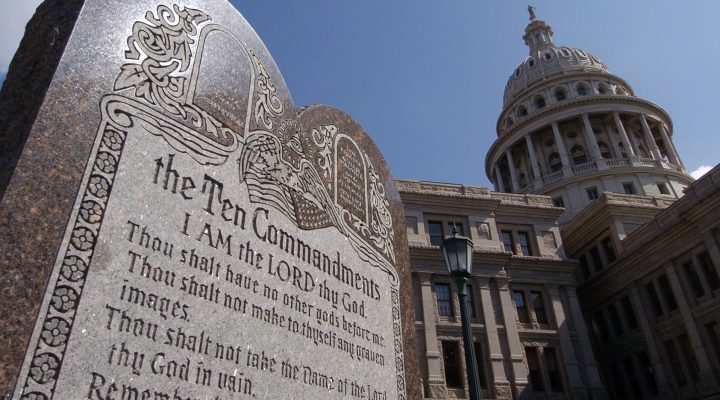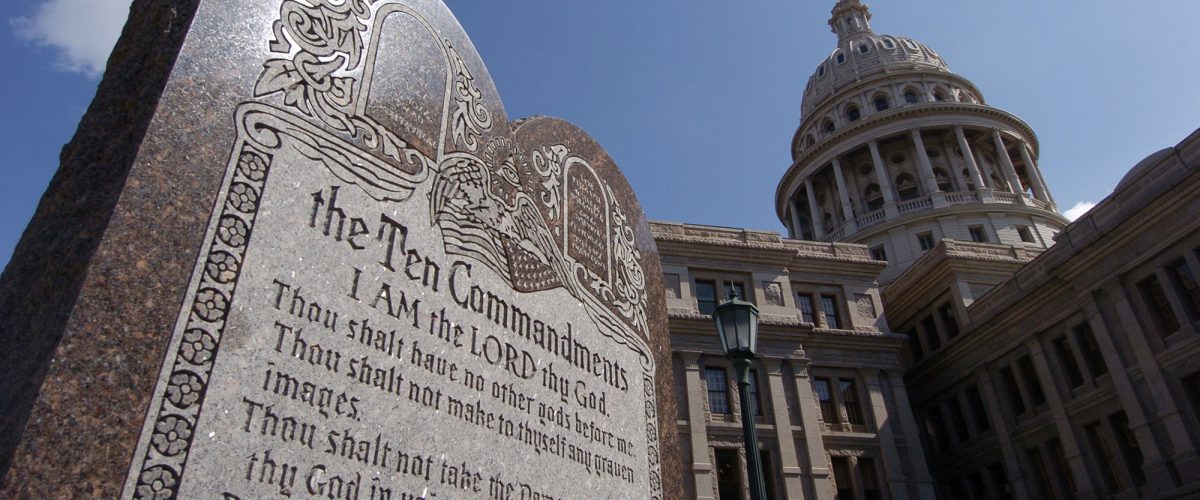Almost three decades ago, a coworker of mine — now a close friend — used to amuse me when she referred to The Ten Commandments as the “Top Ten.” Even before that in college and seminary, where I was taught by scholarly professors and one or two educated Baptist pastors. (Yes, you can use the words educated, Baptist and pastors in the same sentence —at least sometimes.)
These teachers who “rightly divided the word of truth” also divided the Commandments into two categories: the first four dealing with human beings’ relationship to God and the last six giving human beings helpful mandatory guidelines for relating to each other.

Andrew Manis
For this piece let us set aside Number Four (Exodus 20:7), which prohibits taking Yahweh’s name in vain. The first three concentrate on the matter of idolatry, the worship of idols. Number two deals with the prohibition of believers creating “carved images,” which all through the Jewish Scripture is concerned with humans not making images of “anything that is in heaven above, or that is in the earth beneath,” or that is in the water “under the earth.”
Modern readers, who live in countries that are predominantly Jewish, Christian or Muslim, may feel safe if they don’t venerate or outright worship human creations and elevate them to the status of gods. But, as one of my college professors observed, few people in these lands actually create images of their gods by turning them into actual idols (statues). But millions of religious people all over the world cut down trees, create pieces of paper and imprint pictures of respected political leaders on them. The love of money, Scripture says, is the root of all evil. All the more so when money becomes one’s first love. The writer of Exodus would call that modern-day idolatry.
But can one fall into the idolatry of money without intending to do so? Not so the idolatry of Commandments one and three, which evangelical Trumpers have violated with intentionality, heedless of warnings from Christians who eschew Christian nationalism in general and the Trumpian variety in particular.
At the very least, these Trumpians have elevated Donald Trump to divine status and equated him with God. They have put someone quite human before God, in effect having worshiped another “god” before the Jewish/Christian/Muslim God. (See Exodus 20:3.)
Republicans in the U.S. House of Representatives, for example, have bowed down to Trump in refusing to support President Biden’s immigration bill, despite support for it by Sen. James Lankford (R-Okla.) and even the cross-wearing (but not bearing) Sen. Katie Britt (R-Ala.), who also supported it until her new god ordered her and her party to reject it to extend its life as a political issue.
“Then there is the small matter of Trump’s commitment to being a dictator for only one day.”
Then there is the small matter of Trump’s commitment to being a dictator for only one day. So-called Christians who accept this “part-time dictator” promise misunderstand not only the nature of Yahweh’s Top Ten, but also the nature and practice of dictators and also the history of persecution and martyrdom in early Christianity.
First, God’s Commandments are meant to be kept — obediently and faithfully.
Second, once one becomes a dictator, as old time Baptists might have said, “Once a dictator, always a dictator.” No more elections. No more four-year terms. No more peaceful transfers of power. No more freedom.
Third, it was this sort of idolatry that turned regular Christians into heroic martyrs in the first three Christian centuries.
Never mind those American soldiers who died on foreign battlefields defending our freedom. What about our Shadrach, Meshach and Abednego who declined to worship Nebuchadnezzar’s image? Or our early Christian forebears who refused to bow their knees to Caesar and thus were crucified, killed by gladiators or torn apart by lions? Did they die in vain?
Early Christians were far from universally faithful, but many faithfully refused to accept any king but Jesus himself, understood that the “kindom” of God was not of this world, and refused to confess “Caesar is Lord” in favor of “Christ is Lord!”
If Trumpian Christians who say in word and deed that Caesar Trump is Lord are not idolatrous enough for you, consider the thousands (pray God not the millions) of gun-toting MAGA idolaters who at this very hour are prepping for battle the moment Joe Biden wins 270-plus electoral votes in November. The civil war they promise proclaims: “Blessed are those armed with AR-15s and ready to use them on those who refuse to worship Donald Trump” and who include “Thou shall not kill” among the commandments they violate.
“It was this sort of idolatry that turned regular Christians into heroic martyrs in the first three Christian centuries.”
Instead of being faithful to Christ unto death, these Trumpians are Constantinian Christians who hunger and thirst after political power rather than righteousness under the rule of God in Christ Jesus.
The Trump campaign itself is circulating a video titled “God Sent Trump,” portraying him as a new savior for America — “God’s Chosen Paradise.” Fundamentalist author Lance Wallnau has written a paean to Trump in his 2016 volume, God’s Chaos Candidate, portraying Trump as God’s wrecking ball to bring another “reconstruction” to American history.
Trumpians’ fearful souls believe God can only rule America through a Trumpian Caesar because they want divine protection — just as fourth century Christians believed God had elevated Emperor Constantine to rule Christendom in God’s stead. They sought refuge in a Caesar who himself was barely a Christian but was willing to buy the Christian church off with Roman money and imperial protection.
Like their fourth-century forebears, Trumpian “Christians” confuse the reign of Constantine for the reign of God.
But Americans who are first Christian should suffer no such confusion. To them we must insist: “Thou shall not have any gods before God.” If they don’t, may God save the rest of us.
Andrew M. Manis is emeritus professor of history at Middle Georgia State University and author of A Fire You Can’t Put Out: The Civil Rights Life of Birmingham’s Rev. Fred Shuttlesworth. He is currently working with Mark V. Puroshotham, producer and director of Mercy Pictures, on a documentary based on the book. Learn more about that project by emailing [email protected].


